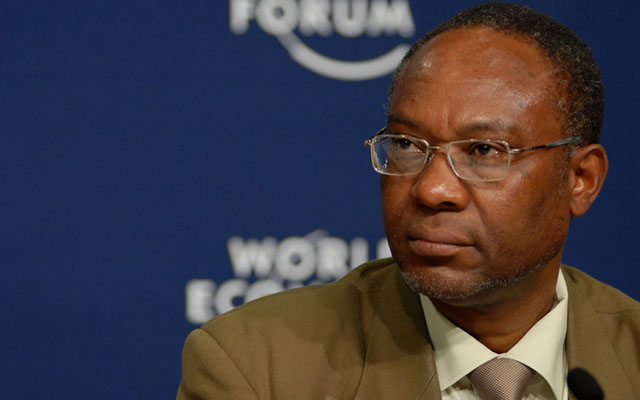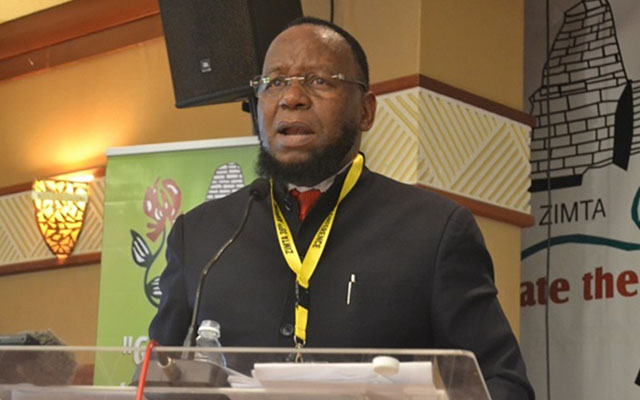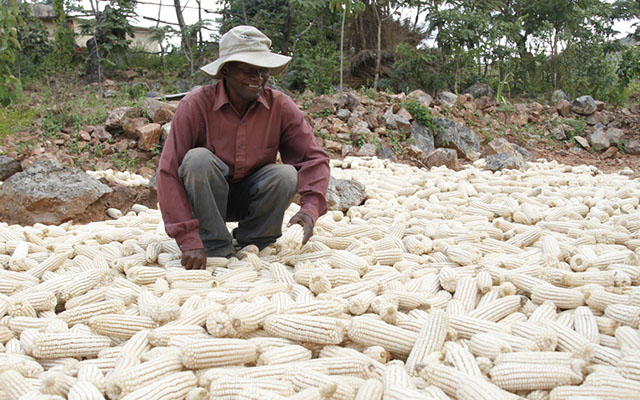‘Support Pan African medical research agenda’


Mr Samkange . . . Scientists must derive their research projects from problems and issues identified by the community. We call it community-based research and the College of Health Sciences of the University of Zimbabwe is proud of our record in this area
THE INTERVIEW Sifelani Tsiko
ST: Can you give us a snapshot of the AMRD theme and what you hope to achieve at this year’s event?
CS: This year’s Annual Medical Research Day theme is “Promoting Health Systems Research for Health Systems Strengthening”.
This theme poses the question: “How can we improve what the health delivery system is doing by looking at how it is performing . . . what works well and can be made to do better, what is not working well, how can we improve it.
What cannot be changed for the better. How do we mitigate the weakness so that we improve health outcomes and create better lives for our people.
ST: Briefly tell us what exactly is taking place at this year’s 25th edition of the AMRD.
CS: This year’s event is exciting. It will be the biggest in terms of the total number of papers being presented. Our previous maximum was 43, but today we anticipate 54 podium presentations. This has arisen because so much research is going on and 78 abstracts were presented.
The event’s Scientific Committee deemed so many are worthy presenting. Indeed, the committee, called “The Small Group” found the task of selection so difficult as the topics were appropriate, the quality high and the relevance to the theme so apt. The event lasts the whole day from 0800 hours till closure at 1730 hours when prizes shall be given for the best papers in eight different categories. In between, to accommodate all the presentations, we shall run parallel sessions in sub-themes.
We do have plenary sessions, including the main guest lecture by the WHO country representative Dr David Okello, who will be addressing how our health system is fairing and why it has done so well in spite of a hostile operating environment
ST: What do you think is the role of medical research innovations in solving some of the problems facing the country’s heath delivery system?
CS: One can broadly divide medical research into three — empirical research that looks at the science of health and health care, the scientific basis of all the interventions we can do to improve well-being, the curative efforts to deal with disease and the rehabilitative efforts to correct the after effects of a disease calamity.
Interventional research can be clinical, social or public health based, looking at what can be done to address specific issues.
Health systems research looks at how the system that supports the health professionals works, the policies and policy frameworks, the logistics and supply chain management, the health managers and the health information management system on which decisions are made.
Medical research at each of these levels is important as it creates an opportunity for new interventions that have better results to be introduced (more effective, more efficient, less side effects, better tolerated, more affordable and more accessible) and innovations in how different solutions are applied allows greater value to be realised by making the system more cost effective, reach wider communities and populations effectively with equity and fairness, especially with regards to vulnerable groups and minorities.
ST: Can you give examples of some of the medical research innovations that provided some solutions to the healthcare sector?
CS: This year’s theme is health systems research, so I will pick an excellent paper that is going to be presented today. It asks the question: are we doing enough for victims of rape? Gender-based violence is of great concern in Southern Africa, more so with the background of the HIV epidemic.
Guidelines on the management of rape look at how the diagnosis made, the immediate treatment that should be offered, including post exposure prophylaxis against the HIV virus and the support and care going forward, including the issue of unwanted pregnancy.
This paper looks at one town and asks how are we doing in helping individual victims who report to our health institutions? How well are we following our own guidelines? How can we improve our effectiveness? Notwithstanding the theme, there are papers from our colleagues in pharmacy, who are looking at nano-formulation, which is the science of using extremely micro small particles of drugs. These are absorbed better after an oral intake, creating less unpleasant side effects; they need to be taken less often and so improve compliance. This means that more patients stick to their prescribed doses, taking their medications for the full course and producing more cures, which is important in such diseases like TB and critical in HIV/AIDS where treatment is for life and here treatment failure requires very expensive second-line drugs that are not so easy to access.
Our pharmacist scientists are working on creating formulations in nano-particles for our people to take common drugs that have hitherto not been tolerated well.
ST: Many people both here in Africa and abroad think there is no effective research going on to improve the quality of health in Zimbabwe and most other African countries. Is this true? What do you think needs to be done to raise the profile of African medical research?
CS: Sadly, that is a widely held perception. Its roots can be traced to the colonial era and its persistence is clear. However, there are modern reasons for perpetuation and these include the publication process. The most revered medical journals come from the west, the system of selection of papers offered for publication has never been fair and African authors often struggle to get their scientific papers accepted for publication.
The solution lies in creating our own platforms for publication and ensuring that these are sound and credible.
Our Annual Medical Research Day, for example, has grown tremendously and has achieved prominence because of the quality of papers we present.
The University of Zimbabwe is proud of the Central African Journal of Medicine that we publish and has an impeccable international reputation and readership. This then provides a platform for African health scientists to publish and reach the international scientific community more than we have been able to do in the past.
ST: Do you think the media in Zimbabwe and most other African countries are playing their part to promote local research outcomes?
CS: Health is not an easy area for a journalist. It has its own language and jargon that is not easy to grapple with. Therefore, media practitioners with comfort in this area are few and so health events do not always get the coverage they deserve.
Issues in health care must be explained in language individuals and communities understand. I must admit that Zimpapers, for example, has made a lot of efforts to prepare journalists to understand more of health topics, but certainly a lot more needs to be done to educate and inform the public on health research and innovations.
Health outcomes improve when the public and communities take greater responsibility for health outcomes and this can only take place when the information is put at their disposal.
We urge the media to make more investments in health reporting. To change the system to work, it requires that every one, individuals, communities and populations must have a shared perception of what are the issues, what are the possible solutions so that interventions are owned communally and everyone invests in solutions they regard as their own for problems they identify as their own.
Scientists must derive their research projects from problems and issues identified by the community. We call it community-based research and the College of Health Sciences of the University of Zimbabwe is proud of our record in this area.
We request and implore the media to then disseminate the research findings to our populations so that they can take ownership of and identify with the solutions so that implementation becomes assured and successful.
ST: Zimbabwe’s healthcare system has been buckling under the weight of inadequate resources, flight of skilled manpower, lack of drugs and equipment and poor ethical adherence to standards by medical personnel. Has our system collapsed? How best can it be improved?
CS: When you listen to the guest lecture you will be surprised that the widely broadcast perception of a “collapsed health delivery system” is contrary to an amazing resilience due the nature of Zimbabweans.
We are incredibly creative and have sustained our system against all odds. We need now to embrace what our researchers are saying are evidence-based solutions to re-discovering our excellence that our neighbours have acknowledged and admired for so long. If you look in the region, a lot of solutions being successfully applied originated from here in Zimbabwe. It is time we empower our own systems to recognise our own people and their proffered innovations.
ST: The AMRD is striving to be the home for research at a level that ranges from basic scientific investigation all the way up to patients in clinical trials. What role can collaborative multi-disciplinary research with outside institution help support local research initiatives?
CS: Thank you for recognising the expanse of the areas being addressed. It is wide and each component critical. The major constraint in addressing all these issues is research funding.
Our governments recognised this and the Abuja Agreement, to which Zimbabwe is a signatory, stipulates that governments must quickly strive to reach 1% of GDP spending on research.
Research and development is the key. The research agenda will then be local, the more the funding is sourced locally. Foreign funders of research will always have their own agenda and sometimes this can be so divergent that local researchers are taken on paths inimical to the desired future of the country. But you need more than funding. You need research skills and capacity. We need to collaborate with foreign institutions to train our researchers in modern skills and technical issues through skills transfer.
We need collaboration with institutions that have technologies we cannot offer locally. Research teams have to be multi-disciplinary in health because the issues are often too complex for an individual researcher or research institution to address alone.
Our aim must be to localise research efforts so that the agenda is ours, the solutions identified are ours and they are applied by us successfully. Development then becomes inevitable.
ST: The College of Surgeons of East, Central and Southern Africa (COSECSA) has fostered postgraduate education in surgery and provided surgical training throughout the region of East, Central and Southern Africa. To what extent has Zimbabwe benefited from this college?
CS: Thank you for bringing up one of our very proud achievements.
I was involved in the inception and progress of this institution. COSECSA is working directly in 10 countries in our region with a reach beyond. We offer training in provincial and district hospitals so that trainees are not translocated during training and continue to offer services to communities during their training. Quality is assured because training is only possible in accredited centres with accredited trainers. This has, in itself, uplifted standards of training and practice which has had a nationwide ripple effect. COSECSA has 94 accredited training institutions in our 10 operating countries with 141 accredited trainers.
We are now examining over a hundred candidates at each of our annual examinations events. This will enable us to achieve our target of 4 000 surgeons in all specialties for our region in the next 20 years. We are currently at less than 1 500. In Zimbabwe COSECSA has produced graduates that have filled posts in orthopaedics, neurosurgery, paediatric and plastic surgery that are serving in our major hospitals and our universities.







Comments